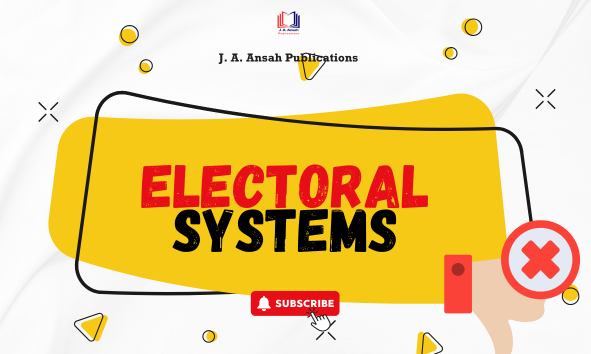ELECTORAL SYSTEMS
DEFINITION
Electoral systems are the procedures and mechanisms by which public elections are conducted.
ELECTORAL PROCESS
Electoral process is defined as the procedure by which citizens of a state have decided to adopt in choosing their leaders. The process of choosing their leaders is known as election. Election is divided into two broad categories which are; direct election and indirect election.
By direct election, citizens reserve the right to individually choose those that will represent their interest and opinions either in the executive or other government positions. It should be noted, however, that some prerequisites must be met before one qualifies to exercise the right to vote.
CHARACTERISTICS OF ELECTORAL SYSTEMS
1. There must be an impartial and independent electoral commission.
2. There must be periodic elections.
3. Delimitation of the country into constituencies should be in place.
4. There must be an acceptable method of nominating candidates for election.
5. There should be an independent judiciary that should handle election petitions without fear or favour.
6. The voting atmosphere should be free from intimidation, victimization and molestation.
7. There should be a comprehensive voters register that embraces all qualified voters; such register must be subject to review from time to time.
TYPES OF ELECTORAL SYSTEMS
Below is a list of the different types of electoral systems.
1. Simple majority system;
2. Absolute majority system;
3. Second ballot system/ run-off system;
4. Alternative voting system;
5. Proportional representation system;
6. Ballot or voting system.
THE SIMPLE MAJORITY /FIRST PAST THE POST SYSTEM
This system is very simple, and it is also referred to as “first past the post”. This is a system in which the candidate with the highest number of the total votes cast is declared the winner, no matter the proportion of votes cast during the election.
For instance, if election candidate A, B and C scored 4,800, 4,500 and 700 respectively in an election, candidate A is declared the winner because he scored the highest number of the total votes cast among all the contestants.
ADVANTAGES OF THE SIMPLE MAJORITY SYSTEM
1. It is very simple to operate as its name implies.
2. It makes it very easy and clear for the election results to be determined.
3. It discourages the formation of coalition governments.
4. It does not encourage the formation of many political parties.
DISADVANTAGES OF THE SIMPLE MAJORITY SYSTEM
1. It is undemocratic since it neglects the wishes of the majority of the voters.
2. Majority ethnic groups can use their numerical strength to secure a simple majority system at the expenses of a minority group.
3. The system leads to waste of surplus votes of the majority of voters.
4. It encourages election rigging in order to secure the highest number of votes.



